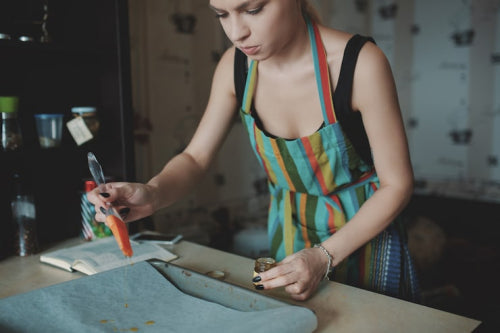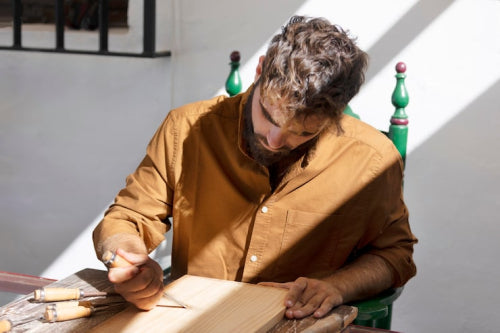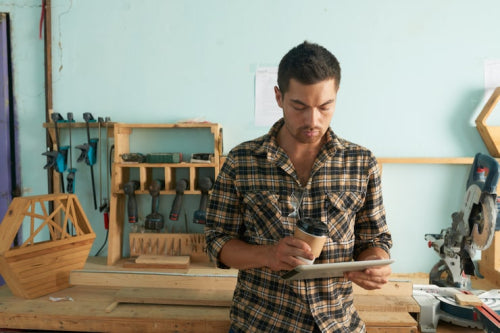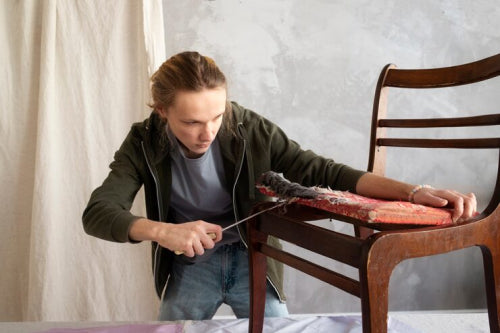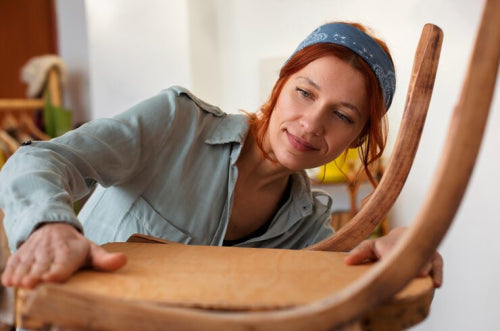In Jaipur's vibrant artisan enclaves, a seasoned craftsman smooths a piece of reclaimed teak, its rich grain shimmering under the dawn's light. Across the workshop, a designer meticulously outlines a minimalist aluminum frame to complement it, merging heritage with innovation. This synergy of time-honored woodworking and modern materials metal, resin, glass is transforming India's furniture industry, from Bengaluru's cutting-edge studios to Chennai's coastal ateliers. It's more than furniture; it's a cultural shift, redefining Indian craftsmanship for a global stage.
Mass-market furniture lacks heart, filling rooms with bland, short-lived pieces. Frequent breakdowns spark frustration, as replacements erode style and sentiment. At MMC Wood Creations, Udaipur artisans shape heirloom furniture with enduring craftsmanship and cozy elegance, creating pieces that echo your identity, ensuring your home radiates warmth and timeless connection. Shop Now!
Hybrid Materials Redefine Modern Craftsmanship in India's Design Capitals
India's metropolitan hubs are experiencing a design revolution. Cities like Bangalore, Mumbai, Jaipur, and Chennai are witnessing a surge in furniture that blends traditional woodworking with contemporary materials, creating pieces that are as functional as they are visually compelling. The India Design Trends 2025 report, published by the Ministry of MSME and CII Craft Council, reveals a 28% year-on-year growth in hybrid furniture segments in urban centers like Hyderabad and Pune from 2023 to 2024. This trend reflects a growing demand among Indian consumers for designs that fuse cultural heritage with modern aesthetics. Udaipur-based MMC Wood Creations exemplifies this movement, combining meticulous craftsmanship with experimental materials to produce furniture that feels both timeless and innovative.
The allure of these hybrid designs lies in their balance of form and function. Pieces like Sheesham tables with brass inlays or teak consoles with resin accents offer durability, aesthetic versatility, and a commitment to sustainable practices. These creations are not mere furnishings; they are bold statements of India's evolving design identity, sparking conversations in homes and offices alike.
The Rise of Material Fusion
In Mumbai, where luxury and minimalism converge, designers are pairing Sheesham wood with brushed brass to craft furniture that exudes understated elegance. According to the India Furniture Market Report 2024 by IMARC Group, this trend resonates strongly with affluent urbanites furnishing high-rise apartments. In Bangalore, tech-driven designers are pushing boundaries with resin-embedded teak tables and aluminum-framed storage units, appealing to young professionals who seek modern, tech-inspired aesthetics for their living spaces.
In southern cities like Chennai and Pune, demand for furniture incorporating glass, stone, and resin has surged by 35%, as reported by the FICCI-CIDC Home Interiors Survey 2024. In Kolkata, traditional marble inlays, once exclusive to opulent estates, are being reimagined with lightweight engineered wood frames, enhancing affordability and portability. These innovations address the practical needs of India's burgeoning urban middle class while maintaining a high standard of craftsmanship.
The integration of diverse materials is not just a design choice but a response to market dynamics. As urban consumers prioritize durability and style, manufacturers are rethinking traditional approaches to meet these expectations, creating furniture that is both practical and aspirational.
Real-World Craftsmanship in Action
Jaipur remains a beacon of traditional craftsmanship, now leading the charge in blending heritage with modernity. Local artisans, collaborating with graduates from the National Institute of Design (NID) in Ahmedabad, are creating furniture that pairs reclaimed teak with anodized metal. The “Desert Steelwood Collection,” featured in the Crafts Council India 2024 report, is gaining international acclaim, particularly in export markets like the UAE and Singapore. These pieces combine Rajasthan's rugged aesthetic with sleek, contemporary lines, offering global buyers a blend of authenticity and innovation.
In Hyderabad and Pune, practicality drives innovation. Hyderabad's workshops are crafting bamboo laminates with powder-coated iron, catering to eco-conscious consumers seeking affordable yet stylish options. Pune's small-scale manufacturers are experimenting with epoxy resin and reclaimed mango wood, producing durable, cost-effective pieces that maintain a high aesthetic standard. These cities demonstrate that hybrid materials can democratize design, making innovative furniture accessible to a broader audience.
These regional efforts highlight the versatility of hybrid craftsmanship, balancing cultural resonance with market demands and showcasing India's ability to innovate within its rich artisanal traditions.
Navigating Challenges
Despite its promise, the shift to hybrid craftsmanship faces significant obstacles. Supply chain inconsistencies hinder manufacturers outside Mumbai and Bangalore, where sourcing high-quality metals and resins remains challenging, according to the India Wood & Allied Materials 2024 Market Brief by FIEO. In Jaipur and Kolkata, traditional artisans struggle to master hybrid joinery and composite material techniques, a gap noted in a 2023 National Institute of Design report. Cost is another hurdle: hybrid materials increase production expenses by 18–22%, as per ICRA's Furniture Sector Insights 2024, posing scalability challenges for mid-tier manufacturers.
Sustainability also presents a dilemma. While reclaimed wood and recycled metals are gaining popularity, the high cost of eco-friendly resins and binders limits their widespread adoption. For many artisans, striking a balance between innovation, affordability, and environmental responsibility remains a complex challenge that requires creative solutions.
Seizing Opportunities
Yet, the opportunities are vast. Urban India's demand for premium hybrid furniture is skyrocketing, with a 45% increase in inquiries from IT professionals and NRIs in Bangalore and Hyderabad. The India Handicrafts Export Promotion Council (EPCH) notes that hybrid collections from Jaipur and Chennai are finding enthusiastic buyers in markets like the UAE and Singapore, fueled by India's growing reputation for modern craftsmanship. The Government of India's Design Clinic Scheme, administered by the MSME Ministry, is supporting this growth by funding hybrid material experimentation and durability testing in Ahmedabad and Pune.
These initiatives are empowering small-scale manufacturers to innovate boldly, blending traditional techniques with cutting-edge technology to create furniture that resonates both domestically and internationally. The result is a vibrant ecosystem where craftsmanship meets global market demands.
The Future of Craft
Technology is a key driver in this transformation. Bangalore's workshops are leveraging CAD/CAM design, CNC carving, and 3D resin printing to achieve precision while preserving the artisanal essence. Research from IIT Madras's Sustainable Materials Lab in 2024 highlights advancements in natural binders and recycled aluminum, paving the way for more sustainable hybrid craftsmanship. Looking forward, the hybrid handcrafted furniture market across India's eight major design hubs is projected to reach ₹7,500 crore by 2030, with a compound annual growth rate of 9.2%, according to Technavio's India Furniture Outlook 2025.
This growth transcends mere economics it's about crafting a new narrative. India's designers are forging an identity that bridges heritage and innovation, producing furniture that tells a story of cultural pride and forward-thinking ambition.
Crafting the Future from India's Heritage
As twilight falls over Udaipur's workshops, artisans at MMC Wood Creations put the final touches on a teak-and-resin console, its surface reflecting a harmonious blend of tradition and modernity. This is the essence of India's new craft movement: a fusion of artistry, innovation, and sustainable sourcing that is reshaping the nation's design landscape. From Jaipur's cultural strongholds to Bangalore's tech-infused studios, India's furniture makers are proving that the future of craft lies in embracing both heritage and possibility. Each piece they create is a testament to reinvention, inviting the world to see India's design legacy in a bold new light.
Frequently Asked Questions
What are hybrid materials in furniture design and why are they trending in India?
Hybrid materials in furniture combine traditional wood (like Sheesham, teak, or reclaimed wood) with modern materials such as metal, resin, glass, and stone. India's hybrid furniture segment has experienced 28% year-on-year growth in urban centers, driven by consumers seeking designs that blend cultural heritage with contemporary aesthetics. This trend reflects a demand for furniture that is durable, versatile, and embodies both traditional craftsmanship and modern innovation.
Which Indian cities are leading the hybrid furniture design movement?
Major design hubs driving India's hybrid furniture revolution include Bangalore, Mumbai, Jaipur, Chennai, Hyderabad, and Pune. Jaipur specializes in reclaimed teak with anodized metal through its "Desert Steelwood Collection," while Bangalore focuses on tech-inspired designs with resin-embedded teak and aluminum frames. Mumbai pairs Sheesham wood with brushed brass for luxury minimalism, and Chennai has seen a 35% surge in demand for furniture incorporating glass, stone, and resin.
What are the main challenges facing hybrid furniture manufacturers in India?
Hybrid furniture makers face three primary challenges: supply chain inconsistencies in sourcing quality metals and resins outside major cities, skill gaps among traditional artisans learning new composite techniques, and increased production costs of 18-22% compared to conventional furniture. Additionally, while reclaimed wood and recycled metals are popular, the high cost of eco-friendly resins limits widespread adoption, making it difficult to balance innovation, affordability, and sustainability.
Disclaimer: The above helpful resources content contains personal opinions and experiences. The information provided is for general knowledge and does not constitute professional advice.
You may also be interested in: How Interior Designers Incorporate Bespoke Wood Pieces
Mass-market furniture lacks heart, filling rooms with bland, short-lived pieces. Frequent breakdowns spark frustration, as replacements erode style and sentiment. At MMC Wood Creations, Udaipur artisans shape heirloom furniture with enduring craftsmanship and cozy elegance, creating pieces that echo your identity, ensuring your home radiates warmth and timeless connection. Shop Now!
Powered by flareAI.co
